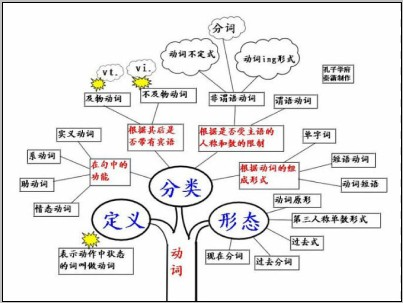本试题 “Work hard or you will __________by someone else.[ ]A. be replacedB. be taken the place ofC. be instead ofD. be removed” 主要考查您对动词
一般将来时的被动语态
等考点的理解。关于这些考点您可以点击下面的选项卡查看详细档案。
- 动词
- 一般将来时的被动语态
动词的定义:
表示动作中状态的词叫做动词。根据其在句中的功能,动词可分为行为动词、系动词、助动词和情态动词四类,有些动词是兼类词。
例如:We have lunch at 12. (have是行为动词)
We have been to NewYork. (have是助动词)
I am hungry. (am是系动词)
You need not have waited for me. (need是情态动词)
The door needs painting. (need是兼类词)
动词的分类:
1)表示动作中状态的词叫做动词。
2)根据其在句中的功能,动词可分为四类,分别是:
实义动词(Notional Verb)、系动词(Link Verb)、助动词(Auxiliary Verb)、情态动词(Modal Verb)。
说明:有些情况下,有些动词是兼类词。
例如:We are having a meeting. 我们正在开会。(having是实义动词。)
He has gone to NewYork.他已去纽约。(has是助动词。)
3)动词根据其后是否带有宾语,可分为两类,分别是:
及物动词(Transitive Verb)、不及物动词(Intransitive Verb),缩写形式分别为vt.和vi.。
说明:同一动词有时可用作及物动词,有时可用作不及物动词。
例如:She can dance and sing. 她能唱歌又能跳舞。(sing在此用作不及物动词。)
She can sing many English songs. 她能唱好多首英文歌曲。(sing用作及物动词。)
4)根据是否受主语的人称和数的限制,可分两类,分别是:
限定动词(Finite Verb)、非限定动词(Non-finite Verb)。
例如:She sings very well. 她唱得很好。(sing受主语she的限制,故用第三人称单数形式sings。)
She wants to learn English well. 她想学好英语。(to learn不受主语she的限制,没有词形变化,是非限定动词。
说明:英语中共有三种非限定动词,分别是:动词不定式(Infinitive)、动名词(Gerund)、分词(Participle)。
5)根据动词的组成形式,可分为三类,分别是:
单字词(One-Word Verb)、短语动词(Phrasal Verb)、动词短语(Verbal Phrase)
例如:The English language contains many phrasal verbs and verbal phrases. 英语里有许多短语动词和动词短语。(contains是单字动词。)
Students should learn to look up new words in dictionaries. 学生们学会查字典。(look up是短语动词。)
The young ought to take care of the old. 年轻人应照料老人。(takecareof是动词短语。)
6)动词有五种形态,分别是:
原形(OriginalForm)、第三人称单数形式(Singular From in Third Personal)、过去式(Past Form)、过去分词(Past Participle)、现在分词(Present Participle)。
动词知识体系:

一般将来时的被动语态:
表示将来要发生的动作和存在的状况且主语是动作的承受着。由shall/will be+done构成。
一般将来时态的被动语态的基本结构的构成:
1、一般将来时态的被动语态的肯定式为:shall/will+be+done。(shall用于第一人称; will用于各种人称)
如:We shall be punished if we break the rule. 如果我们违反规定,我们将要受到惩罚。
The new film will be shown next Thursday. 这部新电影将在下周四上映。
2、一般将来时态的被动语态的否定式为:shall/will+not+be+done.(可缩写成shan't 或won't)
如:The meeting won't be held tomorrow. 明天不再举行会议。
The exhibition won't be put off till next week. 展览会将不会推迟到下周。
3、一般将来时态的被动语态的一般疑问句需将shall/will提到主语的前面。(回答用yes或no)
如:Won't water be turned into ice, if it is below freezing? 如果气温在冰点之下,水难道不会变成冰吗?
—Will the work be finished at once? 这项工作会立刻被完成吗?
—Yes, it will. ?是的,立刻就完成。
4、一般将来时态的被动语态的特殊疑问句为:疑问词+shall/will+S+be+done。
如:When will these books be published? 这些书将在什么时候被出版?
Whom will this book be written by? 谁来写这本书?
一般将来时态的被动语态的其他结构构成:
1、be going to be done:
如:Some old buildings are going to be put down. 一些旧的楼房将被推倒。
The problem isn't going to be discussed at the meeting tomorrow. 这个问题将不在明天的会议上被讨论。
—Arethesetreesgoingtobecutdown?这些树将被砍倒吗?
—Yes,they are. 是的,将被砍倒
2、be to be done:
如:The sports meet is to be held on April10. 运动会将于四月十日举行。
The machines are not to be repaired tonight. 今晚将不会修理这些机器。
—Are new textbooks to be published next week?新教科书将在下周出版吗?
—No, they aren't. 不,不是。
一般将来时态的被动语态的用法:
1、一般将来时态的被动语态的同它的主动语态一样,强调表示根据计划或安排将要发生的被动性动作。
如:The new film will be shown next Thursday. 这部新电影将在下周四上映。
A lot of athletes will be invited to Beijing. 好多运动员将被邀请到北京来。
2、在时间、条件状语从句中,常用一般现在时的被动语态代替一般将来时的被动语态。
如:When the dam is completed, the Changjiang River will be controlled. 当大坝竣工时,长江将得到控制。
If I am given enough time, I will go to Japan for my holiday. 如果我有足够的时间,我将去日本度假。
3、表示有固定性条件就有规律性被动结果。
如:Heated to100℃, water will be turned into steam. 加热到100度时,水将会变成蒸气。
If you speak in class, you will be punished. 如果你在课堂上讲话,你将会被惩罚。
与“Work hard or you will __________by someone else.[ ]A. be ...”考查相似的试题有:
- I to be quite afraid to live in that city, but now I have to the life there.[ ]A. used; been usedB. used; usedC. was ...
- Will you us in the discussion about the students' burden of studies?A.attendB.join inC.take partD.join
- In spite of her spoken French, she can make herself _____ by gesture.A.understandB.understandingC.to understandD....
- Finally, my thanks go to my tutor, who has offered a lot of suggestions and comments on my paperand ________ every pa...
- .If the firms failed to make enough money, they would __________.A.close downB.call offC.turn downD.set off
- There is a saying that acting before thinking always _________ failure.A.requires ofB.results fromC.results inD.b...
- In only 20 years,the country has into an advanced industrial power.[ ]A.translatedB.degradedC.declinedD.transformed
- Mary wanted to travel around the world all by herself,but her parents did not________her to do so.[ ]A. forbidB. allo...
- There was enough evidence to prove that the explosion in Robinson’s house _______ the leak of natural gas.A.resulted...
- — Are you free tomorrow afternoon?— I'm afraid not. I'll have to _____ an important lecture given by a famous profess...